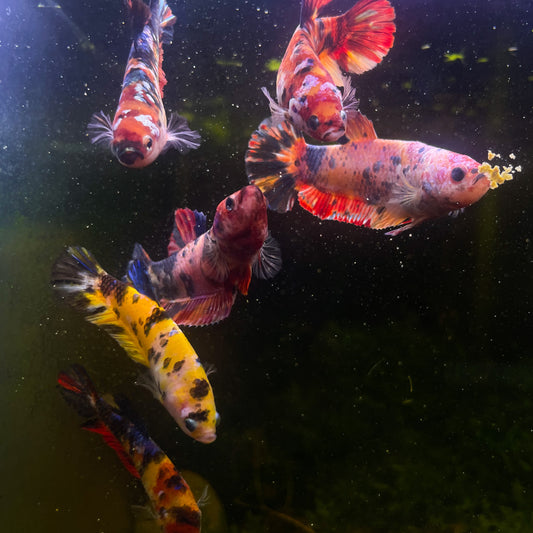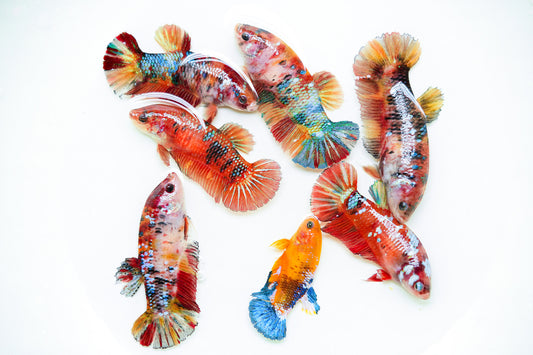Collection of Giant Betta Fish
-
King Giant Plakat Male Betta Fish | You Pick Fish | High Grade - PGA 02
Vendor:Regular price $79.99 USDRegular priceUnit price per$0.00 USDSale price $79.99 USDSold out -
King Giant Plakat Male Betta Fish | You Pick Fish | High Grade - PGA 03
Vendor:Regular price $79.99 USDRegular priceUnit price per$0.00 USDSale price $79.99 USDSold out -
King Giant Plakat Male Betta Fish | You Pick Fish | High Grade - PGA 04
Vendor:Regular price $79.99 USDRegular priceUnit price per$0.00 USDSale price $79.99 USDSold out -
King Giant Plakat Male Betta Fish | You Pick Fish | High Grade - PGA 05
Vendor:Regular price $79.99 USDRegular priceUnit price per$0.00 USDSale price $79.99 USDSold out -
King Giant Plakat Male Betta Fish | You Pick Fish | High Grade - PGA 06
Vendor:Regular price $79.99 USDRegular priceUnit price per$0.00 USDSale price $79.99 USDSold out -
King Giant Plakat Male Betta Fish | You Pick Fish | High Grade - PGA 07
Vendor:Regular price $79.99 USDRegular priceUnit price per$0.00 USDSale price $79.99 USDSold out -
King Giant Plakat Male Betta Fish | You Pick Fish | High Grade - PGA 08
Vendor:Regular price $79.99 USDRegular priceUnit price per$0.00 USDSale price $79.99 USDSold out -
King Giant Plakat Male Betta Fish | You Pick Fish | High Grade - PGA 09
Vendor:Regular price $79.99 USDRegular priceUnit price per$0.00 USDSale price $79.99 USDSold out -
King Giant Plakat Male Betta Fish | You Pick Fish | High Grade - PGA 10
Vendor:Regular price $79.99 USDRegular priceUnit price per$0.00 USDSale price $79.99 USDSold out -
King Giant Plakat Male Betta Fish | You Pick Fish | High Grade - PGA 11
Vendor:Regular price $79.99 USDRegular priceUnit price per$0.00 USDSale price $79.99 USDSold out -
King Giant Plakat Male Betta Fish | You Pick Fish | High Grade - PGA 12
Vendor:Regular price $79.99 USDRegular priceUnit price per$0.00 USDSale price $79.99 USDSold out -
King Giant Plakat Male Betta Fish | You Pick Fish | High Grade - PGA 13
Vendor:Regular price $79.99 USDRegular priceUnit price per$0.00 USDSale price $79.99 USDSold out -
King Giant Plakat Male Betta Fish | You Pick Fish | High Grade - PGA 14
Vendor:Regular price $79.99 USDRegular priceUnit price per$0.00 USDSale price $79.99 USDSold out -
King Giant Plakat Male Betta Fish | You Pick Fish | High Grade - PGA 16
Vendor:Regular price $79.99 USDRegular priceUnit price per$0.00 USDSale price $79.99 USDSold out -
King Giant Plakat Male Betta Fish | You Pick Fish | High Grade - PGA 17
Vendor:Regular price $79.99 USDRegular priceUnit price per$0.00 USDSale price $79.99 USDSold out -
King Giant Plakat Male Betta Fish | You Pick Fish | High Grade - PGA 18
Vendor:Regular price $79.99 USDRegular priceUnit price per$0.00 USDSale price $79.99 USDSold out -
King Giant Plakat Male Betta Fish | You Pick Fish | High Grade - PGA 19
Vendor:Regular price $79.99 USDRegular priceUnit price per$0.00 USDSale price $79.99 USDSold out -
Super Red Giant Plakat Male Betta Fish
Vendor:Tropicflow's Plakat Male BettaRegular price $70.00 USDRegular priceUnit price per -
Multicolor King Giant Plakat Male Betta Fish | Mystery Betta
Vendor:Tropicflow's Plakat Male BettaRegular price From $50.00 USDRegular priceUnit price per$60.00 USDSale price From $50.00 USDSale -
Female Giant Betta Fish
Vendor:Tropicflow's Female BettaRegular price $50.00 USDRegular priceUnit price per$0.00 USDSale price $50.00 USD -
Giant Koi Nemo Female Betta Fish Sorority | Successful Sorority Pack
Vendor:Tropicflow's Female BettaRegular price From $150.00 USDRegular priceUnit price per$200.00 USDSale price From $150.00 USDSale
FAQs
FAQs about Giant Betta Fish
What is a giant betta fish?
A giant betta fish is a selectively bred variant of the traditional betta fish that is much larger in size. Typically reaching up to 4 to 5 inches in length, giant bettas are prized for their impressive size and vibrant colors, making them a standout choice for aquarium enthusiasts.
How big can a Giant Betta Fish grow?
The largest giant bettas can reach up to 5 inches (12–13 cm) in length, making them nearly double the size of standard bettas. This size depends on genetics, diet, and tank conditions.
Are Giant Betta Fish aggressive?
Like most bettas, giant bettas are territorial and can be aggressive, especially towards other males. They should be housed alone or with peaceful, non-fin-nipping tankmates in a properly sized tank.
Where do Giant Betta Fish come from?
Giant bettas originate from Thailand, where expert breeders have developed the line through selective breeding of larger-than-average Betta splendens over many generations.
What is the difference between Giant Betta Fish and King Betta Fish?
While both are larger than standard bettas, Giant Betta Fish are selectively bred for size and can grow up to 3–5 inches. King Betta Fish are often mislabeled.
They are typically a variation of plakat bettas and usually max out around 2.5–3 inches. True giants are larger, rarer, and bred through specific giant genetics.
Do Giant Betta Fish live longer than regular bettas?
In most cases, giant bettas have a similar or slightly shorter lifespan than standard bettas. Their average lifespan is 2.5 to 4 years, depending on genetics, tank conditions, and overall care.
Are Giant Betta Fish healthy?
Yes, when properly bred and cared for, giant bettas can be very healthy and hardy. However, because of their size, they require more space, clean water, and a high-protein diet to thrive.
Where to buy giant betta fish?
Giant betta fish are available at Tropicflow, your go-to source for healthy and vibrant aquarium fish. Tropicflow specializes in a variety of betta fish, including the larger giant betta species.
How to breed giant betta fish?
To breed giant betta fish, ensure you have a mature male and female. Set up a breeding tank with warm water (around 80°F), shallow depth, and places for hiding. Introduce the female to the tank and monitor interactions closely. After spawning, remove the female and let the male care for the eggs until they hatch.
What is the biggest giant betta Tropicflow has ever carried?
Tropicflow once carried a remarkable giant betta that measured an impressive 6 inches in length, making it one of the largest specimens available in the retail market.
Our selection varies, but we strive to provide some of the most exceptional giant bettas available.
What is the lifespan of a Giant Betta Fish?
Giant bettas typically live 2.5 to 4 years with proper care. Factors like water quality, diet, and tank size play a big role in how long they live.
What is the minimum tank size for a giant betta fish?
The minimum recommended tank size for a giant betta fish is 10 gallons. However, a larger space, such as a 20-gallon tank, is ideal to provide ample room for swimming and maintaining high water quality.
This size helps accommodate their larger size and supports better health and more active behavior.
What is a Wild Giant Betta?
A Wild Giant Betta usually refers to Betta bellica, a large wild species found in the forests of Malaysia and Thailand. Unlike domestic giants, they have more natural coloration and behaviors, and they thrive in blackwater, tannin-rich environments.




























